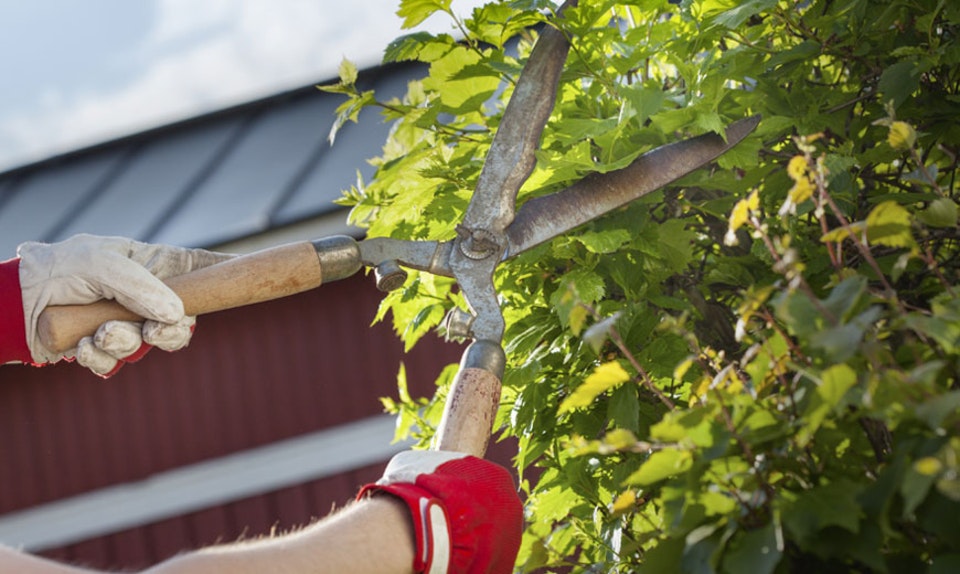Caring for Established Trees
To protect your investment in trees, remember these care tips. Healthy trees increase in value over time. This helps by increasing property values, beautifying yards and landscapes, purifying the air, and saving energy through cooling shade and wind protection.
Mulch
Mulching can reduce stress by providing trees with a stable root environment that offers a more consistent temperature and contains more moisture than the surrounding soil. Mulch can also prevent mechanical damage by keeping machines such as lawn mowers and string trimmers away from the tree’s base. Also mulch helps reduces competition from surrounding weeds and turf.
To be most effective in all of these functions, mulch should be placed 2 to 4 inches deep and cover the entire root system, which may be as far as 2 or 3 times the diameter of the branch spread of the tree. If the area and activities happening around the tree do not permit the entire area to be mulched, it is recommended that you mulch as much of the area under the drip line of the tree as. When placing mulch, care should be taken not to cover the actual trunk of the tree. This mulch-free area, 1 to 2 inches wide at the base, is sufficient to avoid moist bark conditions and prevent trunk decay.
An organic mulch layer 2 to 4 inches deep of loosely packed shredded leaves, pine straw, peat moss, or composted wood chips is adequate. Plastic should not be used because it interferes with the exchange of gases between soil and air, which inhibits root growth. Thicker mulch layers, 5 to 6 inches deep or greater, may also inhibit gas exchange.
Mulching newly-planted trees and established trees is a good way to ensure their health. Create a 4 foot (or larger) circle of wood chips, compost, or other coarse organic mulch around the tree. It should be 4 inches deep in order to help control weeds, keep roots moist, reduce soil compaction, and to provide a buffer between the tree’s trunk and mowing. If the lawn is already established around the tree, place the mulch directly on the turf. Any grass not shaded-out by the mulch can easily be pulled.
Fertilization
Fertilization is another important aspect of mature tree care. Trees require certain nutrients (essential elements) to function and grow. Urban landscape trees can be growing in soils that do not contain sufficient available nutrients for satisfactory growth and development. In these situations, it may be necessary to fertilize to improve plant vigor.
Fertilizing a tree can improve growth; however, if fertilizer is not applied wisely, it may not benefit the tree at all and may even adversely affect the tree. Mature trees making satisfactory growth may not require fertilization. When considering supplemental fertilizer, it is important to know which nutrients are needed and when and how they should be applied.
Soil conditions, especially pH and organic matter content, vary greatly, making the proper selection and use of fertilizer a somewhat complex process. When dealing with a mature tree that provides considerable benefit and value to your landscape, it is worth the time and investment to have the soil tested for nutrient content. Any arborist can arrange to have your soil tested at a soil testing laboratory and can give advice on application rates, timing, and the best blend of fertilizer for each of your trees and other landscape plants.
Mature trees have expansive root systems that extend from 2 to 3 times the size of the leaf canopy. A major portion of actively growing roots is located outside the tree’s drip line. It is important to understand this fact when applying fertilizer to your trees as well as your turf. Many lawn fertilizers contain weed and feed formulations that may be harmful to your trees. When you apply a broadleaf herbicide to your turf, remember that tree roots coexist with turf roots. The same herbicide that kills broadleaf weeds in your lawn is picked up by tree roots and can harm or kill your broadleaf trees if applied incorrectly. Understanding the actual size and extent of a tree’s root system before you fertilize is necessary to determine how much, what type, and where to best apply fertilizer.
Pruning
Pruning is the most common tree maintenance procedure next to watering. Pruning is often desirable or necessary to remove dead, diseased, or insect-infested branches and to improve tree structure, enhance vigor, or maintain safety. Because each cut has the potential to change the growth of (or cause damage to) a tree, no branch should be removed without a reason.
Removing foliage from a tree has two distinct effects on its growth. Removing leaves reduces photosynthesis and may reduce overall growth. That is why pruning should always be performed sparingly. Overpruning is extremely harmful because without enough leaves, a tree cannot gather and process enough sunlight to survive. However, after pruning, the growth that does occur takes place on fewer shoots, so they tend to grow longer than they would without pruning. Understanding how the tree responds to pruning should assist you when selecting branches for removal. Pruning mature trees may require special equipment, training, and experience. If the pruning work requires climbing, the use of a chain or hand saw, or the removal of large limbs, then using personal safety equipment, such as protective eyewear and hearing protection, is a must. Arborists can provide a variety of services to assist in performing the job safely and reducing risk of personal injury and damage to your property. They also are able to determine which type of pruning is necessary to maintain or improve the health, appearance, and safety of your trees.
About McMakin Farms
McMakin Farms is a family-owned wholesale tree farm and nursery located in Lyman, SC (Greenville-Spartanburg area). We provide a broad selection of trees to a variety of wholesale clients including landscape architects, landscape installers, general contractors, facility management companies and nurseries.






